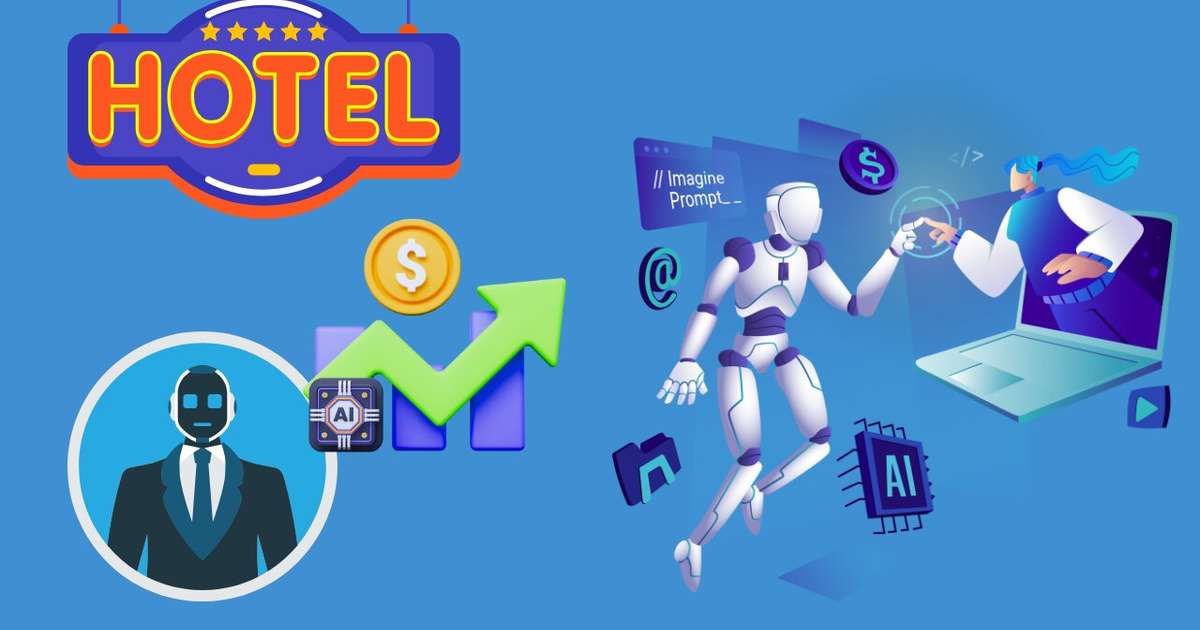
In the early computer age, when the first hotel property management systems arrived, most hoteliers saw them as tools, not turning points. These machines helped process reservations, print folios, and store guest records faster than any ledger could. But in hindsight, those systems changed everything.
The PMS quietly redefined control. Suddenly, what used to live in a front desk logbook was managed by a few lines of digital code. It gave rise to online distribution, to OTAs, to yield management, and to the realization that whoever owned the data, owned the guest.
We are standing at that crossroads again.
Only this time, the system doesn’t just store information. It thinks, acts, and increasingly, transacts.
The AI Revolution Isn’t Coming, It’s Already Here
For most of us, AI has already become background noise. It hums quietly in the tools we use every day. When you receive a “smart reply” in Gmail, that’s AI. When you check your hotel’s dynamic pricing or revenue forecast, there’s a machine learning model crunching the probabilities behind the scenes. When a guest writes a review and your ranking shifts overnight, an algorithm is already at work.
Even your payments are filtered through layers of AI that evaluate risk and prevent fraud in milliseconds. We already live in an AI-powered hotel ecosystem; we just stopped noticing.
The real disruption, therefore, isn’t about introducing something new. It’s about recognizing how deep it already runs, and what happens when the intelligence stops being silent and starts being visible, conversational, and creative.
That’s where the paradigm truly shifts.
From Conversation to Commerce
OpenAI’s recent evolution makes this change visible for the first time. The company behind ChatGPT, now one of the most visited websites on Earth, has introduced the ability to buy products directly inside a chat.
Through its collaborations with Shopify and Etsy, ChatGPT now allows users to go from “I like that” to “I bought it” in one smooth conversational flow. No browser tab, no checkout page — just a natural conversation that ends with a confirmed purchase.
And that, for hospitality, is the spark of something enormous.
Imagine a traveler asking their AI assistant, “Find me a boutique hotel in Copenhagen with a rooftop bar and late check-out.” The AI browses live inventory, compares reviews, filters by neighborhood vibe, and then, when the guest says “book it”, completes the reservation and payment instantly.
The guest never visits your website, never calls your reservation line, and never sees an OTA homepage. The entire booking, personalization, and payment happen within a conversation.
The Stripe Layer: The Invisible Engine Behind It All
This seamless flow exists because OpenAI partnered with Stripe, one of the most advanced payment infrastructures in the world. Together, they’ve built what’s being called the Agentic Commerce Protocol, a framework that allows AI systems to safely execute real payments on behalf of users.
For hotels, this means a future where your inventory, pricing, and payment logic can integrate directly into conversational channels. Guests will be able to confirm a room, add dinner, upgrade to a suite, and pay, all within seconds, with Stripe handling the transaction securely in the background.
Hotels remain the merchant of record, which means you still control refunds, receipts, and guest communications. And Stripe’s own AI models optimize conversion and security in real time. In short, your next great booking assistant might not just talk like a concierge; it could think like a revenue manager.
The OTAs Are Moving, Too
While many hotels are still debating AI policy, the major online travel agencies are already embedding it deep into their guest experiences.
Booking.com, Expedia, and Airbnb are building OpenAI-powered trip planners that respond to natural language, “I want a quiet mountain retreat within 3 hours of Milan”, and instantly suggest personalized stays. The conversation continues with modifications, reviews, and pricing, and ends with a single click to book.
These AI trip planners no longer behave like search engines; they act like personal travel agents who already know the traveler’s preferences. And because they’re powered by live OTA inventory, they are slowly shifting visibility away from traditional web listings toward conversational interactions.
That means that tomorrow’s “ranking algorithm” will be a dialogue between your property data and a guest’s AI assistant.
A Glimpse into the Near Future
Picture this moment.
A guest messages your front desk chatbot late at night: “Can I extend my stay by one night and add dinner for two tomorrow?”
The AI checks availability, confirms the new rate, adjusts the booking, sends a note to housekeeping, reserves a table in your restaurant, calculates the additional charge, and completes the payment, all before your night auditor finishes their report.
No friction. No back-and-forth. No missed upsell.
That’s what the Stripe and OpenAI ecosystem makes possible: an AI that doesn’t just chat, it acts.
The Inner Transformation: When AI Becomes a Compass
For me, this isn’t only an industry shift, it’s been a personal one.
Studying AI has changed the way I think about progress, purpose, and even perception itself. When I first began exploring it, I approached it like any other technology: something to be learned, mastered, and applied. But over time, I realized AI isn’t simply a tool, it’s a mirror and a compass.
Just as sailors once read the stars to find their way across uncharted seas, we now learn to read the patterns of intelligence emerging in our machines. The stars didn’t move the ship; they guided the human hand that did. AI feels the same to me. It doesn’t steer your course, but it shows you where you are, and hints at where you could go.
In that sense, AI becomes an instrument for orientation, not direction. It invites reflection: What does intelligence mean when it is no longer rare? What remains uniquely human when everything else can be predicted, summarized, or automated?
The more I work with AI, the more I realize that it expands not only capability but consciousness. It pushes you to think in systems, to anticipate second-order effects, to understand your own biases, and to design with empathy. It refines your judgment, not by giving you all the answers, but by asking better questions.
For me, AI has been a kind of mental compass, a new way to measure progress, recalibrate curiosity, and rediscover direction in an uncertain world.
It reminds me that leadership isn’t about having perfect foresight. It’s about learning to navigate by new stars.
A Cultural Revolution, Not Just a Technological One
Hospitality has always been about human connection, but AI changes how we allocate that human energy. Instead of spending it on repetition, we’ll spend it on empathy, creativity, and recovery. Instead of training staff to remember hundreds of policies, we’ll train them to coach and collaborate with AI systems that remember everything for them.
The job of a GM or Director of Sales will evolve from managing tasks to designing the logic that defines great decisions. Data, pricing, guest feedback, and even operational insights will flow through one intelligent layer.
AI won’t erase hospitality; it will reveal its essence.
The New Meaning of Optimization
For decades, “optimization” in hotels meant squeezing more yield out of static systems, forecasting demand, managing rates, and improving conversion percentages. But in the age of AI, optimization no longer means fine-tuning; it means evolving.
AI doesn’t just optimize for efficiency; it optimizes for adaptability. It learns from every guest interaction, every booking pattern, every operational challenge. It redefines what “best” looks like, not once a quarter, but in real time.
For a revenue manager, that might mean prices that self-correct to balance profit and occupancy minute by minute. For a guest-experience team, it means anticipating needs before they’re voiced. For leadership, it means decision-making that is more contextual, dynamic, and data-literate than ever before.
But perhaps the most dramatic shift is happening outside the property walls — in how guests discover hotels in the first place.
Optimization now extends into visibility. Travelers no longer begin with search engines; they begin with AI companions, intelligent assistants capable of filtering millions of options through context, preference, and conversation. When someone says, “Find me a romantic hotel in Lisbon with late checkout and a local wine bar nearby,” the AI doesn’t crawl ads or meta-search sites; it reasons. It understands intent, sentiment, and constraints, and surfaces only the hotels that are structured, described, and connected well enough for it to trust.
That’s the new SEO of hospitality: machine readability meets human resonance. If your property data, reviews, amenities, and location stories aren’t formatted and optimized for AI interpretation, you risk disappearing from the discovery layer entirely.
Optimization has therefore shifted from being a mechanical process to a living dialogue between human insight and machine intelligence, each enhancing the other. It’s not just about doing things faster; it’s about doing them truer, closer to the guest, the market, and the moment.
In this new landscape, the hotels that thrive will be those that think like the AI systems guests now consult: responsive, transparent, and relentlessly guest-centric.
The Data Paradigm: The Silent Revolution Behind It All
Beneath every algorithm and automation lies the true currency of this new era: data. It’s data, structured, trusted, contextual, that now determines which hotels the world’s AI systems can “see,” understand, and recommend.
In many ways, data is the new hospitality language. And the most important question for hotel leaders isn’t just how to use AI, it’s how to feed it.
Are your room descriptions written for humans and machines? Do your systems talk to each other, or are they still islands of disconnected information? Can your guest data tell a story, or does it simply record one?
Because the truth is: AI can only be as good as the data it’s trained on. And for the first time, the clarity, consistency, and accessibility of your data may define your visibility, your revenue, and even your relevance in the decade ahead.




